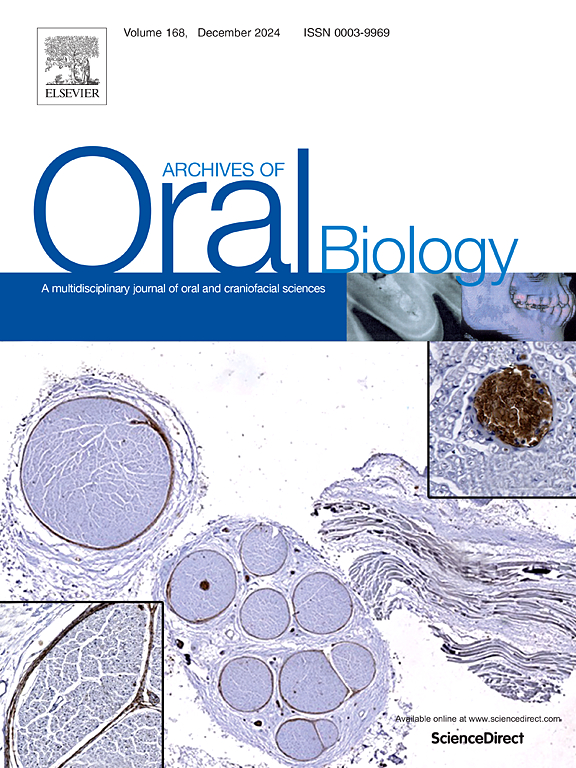Profiling mRNA encoding glucocorticoid receptor α in saliva: Relationship to hair cortisol levels in individuals aged 15–25 years
IF 2.2
4区 医学
Q2 DENTISTRY, ORAL SURGERY & MEDICINE
引用次数: 0
Abstract
Objective
We assessed levels of mRNA encoding two glucocorticoid receptor (GR) isoforms (GRα and GRβ) in saliva and examined their relationship with hair cortisol levels and dental caries experience.
Design
Adolescents and young adults were assessed for dental caries experience, and hair cortisol was measured by ELISA. RNA was extracted from whole saliva using TRIzol, followed by quantitative real-time PCR analysis of GRα, GRβ, and glyceraldehyde 3-phosphate dehydrogenase (GAPDH).
Results
GRβ mRNA was not detectable in most samples, whereas GRα mRNA was observed in all samples. There were significantly lower levels of GRα mRNA in individuals with elevated hair cortisol levels than in those with normal cortisol levels. Levels of GRα mRNA did not differ significantly in individuals with dental caries experience compared to individuals with no caries experience.
Conclusions
We identified and quantified mRNA encoding GRα in saliva. Its levels were inversely associated with hair cortisol (a marker of chronic stress). Although caries experience was associated with hair cortisol levels, there was no significant association between GRα levels and caries experience. Chronic stress has been proposed to be associated with reduced expression of GRα and this association appears to hold for GRα mRNA levels in saliva.
唾液中编码糖皮质激素受体α的mRNA分析:与15-25岁个体毛发皮质醇水平的关系
研究目的我们评估了唾液中两种糖皮质激素受体(GR)异构体(GRα和GRβ)的mRNA编码水平,并研究了它们与毛发皮质醇水平和龋齿经历的关系:设计:对青少年和年轻成年人进行龋齿经历评估,并通过酶联免疫吸附法测定毛发皮质醇。使用TRIzol从整个唾液中提取RNA,然后对GRα、GRβ和3-磷酸甘油醛脱氢酶(GAPDH)进行定量实时PCR分析:结果:大多数样本中检测不到 GRβ mRNA,而所有样本中都检测到 GRα mRNA。毛发皮质醇水平升高者的 GRα mRNA 水平明显低于皮质醇水平正常者。与无龋齿经历的人相比,有龋齿经历的人的 GRα mRNA 水平没有明显差异:结论:我们发现并量化了唾液中编码 GRα 的 mRNA。其水平与毛发皮质醇(慢性压力的标志物)成反比。虽然龋齿经历与毛发皮质醇水平相关,但 GRα 水平与龋齿经历之间并无显著关联。慢性压力被认为与 GRα 的表达减少有关,这种关联似乎也与唾液中 GRα mRNA 的水平有关。
本文章由计算机程序翻译,如有差异,请以英文原文为准。
求助全文
约1分钟内获得全文
求助全文
来源期刊

Archives of oral biology
医学-牙科与口腔外科
CiteScore
5.10
自引率
3.30%
发文量
177
审稿时长
26 days
期刊介绍:
Archives of Oral Biology is an international journal which aims to publish papers of the highest scientific quality in the oral and craniofacial sciences. The journal is particularly interested in research which advances knowledge in the mechanisms of craniofacial development and disease, including:
Cell and molecular biology
Molecular genetics
Immunology
Pathogenesis
Cellular microbiology
Embryology
Syndromology
Forensic dentistry
 求助内容:
求助内容: 应助结果提醒方式:
应助结果提醒方式:


